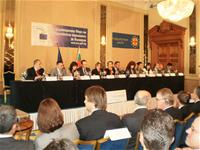Bulgaria should insist against Europe on two speeds
Ralitsa Kovacheva, July 11, 2010
 A part of the Bulgarian representatives in the European Parliament came to Sofia to participate in a discussion dedicated to the first year of their term. Each of the MEPs briefly presented a specific area of activity and answered some questions from the public. euinside chose to focus on two of the most important topics on European Union's agenda currently: the economic governance and the reform of the CAP Common Agricultural Policy).
A part of the Bulgarian representatives in the European Parliament came to Sofia to participate in a discussion dedicated to the first year of their term. Each of the MEPs briefly presented a specific area of activity and answered some questions from the public. euinside chose to focus on two of the most important topics on European Union's agenda currently: the economic governance and the reform of the CAP Common Agricultural Policy).
Adelina Marini's interview with Ms Mariya Nedelcheva (EPP, GERB) on the future of the CAP you can see here. I talked to Mr Ivaylo Kalfin (Progressive Alliance of Socialists and Democrats, Coalition for Bulgaria) about the economic and financial challenges the Union is facing.
Ivaylo Kalfin is a Vice-Chair of the Committee on Budgets and a member of the  Special Committee on the Financial, Economic and Social Crisis and the Special committee on the policy challenges and budgetary resources for a sustainable European Union after 2013.
Special Committee on the Financial, Economic and Social Crisis and the Special committee on the policy challenges and budgetary resources for a sustainable European Union after 2013.
euinside: Tell us more about the newly created Committee on the Future of the Union after 2013.
Ivaylo Kalfin: This committee will outline the basic framework for the development of the financial and budgetary outlook of the Union after 2013. Because in the current budgetary framework (2007-20013) the policies have already been defined - the agricultural and regional policies consume nearly 80 percent of EU's overall budget. There are a great many voices, ideas, even pressure these policies to be changed, the EU to deal with new things; eventually, to be seen if it is possible extra budgetary sources to be found in EU's budget. Because it is a very small budget - one percent of the economy of the Union, but the expectations and ambitions are high. So the Committee will deal with this - what the EU will look like, what policies will be developed and how these will be financed after 2013.
euinside: Are there any voices the absorption of EU funds by country to be taken into account during the negotiations on the next fiscal framework and programme financing?
Ivaylo Kalfin: Undoubtedly this will be one of the arguments of those who want the way EU funds are spent to be changed. They use it now, saying: there is no need to allocate funds to countries that do not absorb well or to programmes that are clearly not effective, since the funds cannot be absorbed. At the same time, our country’s interest is the way of financing of the regional development and agriculture not to be significantly changed. If there will be some changes, these should be aimed at easing procedures and the funds to be increased.
Because there is a strong pressure (mainly from the “donor” countries) the agricultural and regional policies to be restructured in a totally different way in order everyone to receive EU funds, and not as it is now - there are donor countries and recipient countries. This would substantially reduce the funds to which Bulgaria has access. The point of colleagues like me is that ultimately solidarity is one of the most important principles in the EU and this redistribution of funds has its logic - it is to help lagging countries and regions to catch up and this is in EU's interest as well.
euinside: How do you assess the European Commission's attempts to impose greater budgetary and economic control on Member States?
Ivaylo Kalfin: In this regard the Commission is not sufficiently active. The simplest example is related to the single currency. You cannot maintain a stable common currency without a common fiscal policy. What is being done so far is policy coordination among the countries. It is clear that many countries violate the parameters of Maastricht - Germany, for example, was the first country to violate the Maastricht criteria. Obviously this is not the way to govern a single currency zone, but rather a parallel could be made there with an economy like the United States - the states have legislative independence, but share a common budget and a common centralised policy. But this cannot be achieved with a budget of 1 percent of the economy.
So what the European Commission is doing now is to try and find stronger penalties for violation of the existing principles. What should be done is opportunities to be provided for a real fiscal policy in the EU. This means the EU to take more functions (which are not limited primarily to the maintenance of the common market) which to be seized by national governments. When there is a common currency, it is obvious that there must be a supranational level which to be able to take decisions, so there is no contradiction in this.
euinside: Do you think the recent decisions in this area are a signal for a separation of the euro area from the non-eurozone Member States and how do you assess that?
Ivaylo Kalfin: This is happening now and I notice with a surprise that no one in Bulgaria, nor in the other nine member countries (from January 1, 2011 Estonia will be the 17th member of the euro zone) do not put this issue acutely enough. Because strong mechanisms for integration within the euro area are being created at the moment, which automatically reduces the integration mechanisms outside the euro area.
For example, the Council's decision on the establishment of the European stabilization mechanism: in fact it is a company registered in Luxembourg, which in practice will serve as a European Monetary Fund, but without intergovernmental structure and a capital of its own. It is being done to help countries that have financial and budgetary problems and this is very useful. What is not clear is why it will work only for the euro area countries. Bulgaria is also involved in ensuring this mechanism indirectly through EU's budget, but it cannot take an advantage of it. This is one of the latest examples of how integration in within the euro area is growing and the non-euro states drop out of the circle of countries entitled to make decisions.
euinside: The government is constantly reassuring us with a small budget deficit and low public debt, but don’t you think that the bigger problem of Bulgaria is in the economy that is behind and the way it is developing?
Ivaylo Kalfin: This is absolutely right. It turned out that the European approach had some defects, but the Bulgarian approach is now totally wrong. The eurozone with a common currency has been established by countries that were very different and it was decided that with the introduction of 5-6 indicators in the Maastricht Treaty, they will begin to converge. With over 10 years of experience in the euro area it is now obvious they are not catching up but rather drifting away. The countries with lower competitiveness (or convergence) in practice lose from their participation in the euro area, or at least earn less than the others. For example Spain, which was fulfilling all Maastricht criteria, but turned out to be one of the largest economies with significant problems.
Obviously, this kind of coordination does not work. The answer is in something else and it is already beginning to appear in some policy documents, although so far only economists have talked about it. A common currency area could exist only among economies that are comparable, with a similar level of development. In the euro area we saw what happened to Greece, Ireland, Portugal, Spain, because their economies are far behind in the euro area. So the eurozone is not a political mantra or a wish, but rather an economic process - we must strive for it, but it means our economy to become competitive, to become comparable to an averagely developed European country. Then the issue of a eurozone membership will be on the agenda.
euinside: Do you see signs of deliberations what to be done with the economy?
Ivaylo Kalfin: I absolutely don’t see such a thing. At the moment the government has limited economic policy to fiscal policy. We have no other issues except some budget numbers, which on top of it are constantly changing. This is not an economic policy. Fiscal policy is very important, but it does not and not in this way create a perspective for the development of the economy and nor will make it competitive. For the last 3-4 years we had wonderful budget indicators, we were pointed as an example of macroeconomic policy, but we would be lying to ourselves if we believe that Bulgaria has reached the leading European countries only because it had good budgetary indicators.